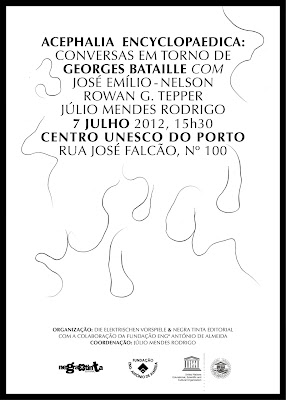Schizogenesis
Georges Bataille
Translation by Prof. Rowan
V
Today, when I make love, my pleasure is no longer obscured by the feeling that it will end – and that I will die without having been satisfied. It came to me like a dream, during that happy excess which burning pleasure itself annuls: I imagine a time where I would no longer possess the means to renew it. I lacked the feeling of the exuberant richness of the festival, the puerile malice and laughter which is equal to God! It is true, this power itself is declining: it is of the same nature as pain. Abandon myself to my moods? Rather, I give myself to an impossible and I come like a dying monster.
Rome, a taxi-cab, Mme E...Violent lightning of an electrical storm. Rains and moon in the white streets of comic-opera: pines, delights and indolence.
I accept life on one condition.
Through sublimity, eternity, lies, to have sung at the top of my lungs, carried by a theatre-chorus.
Bought a wolf for Mme E... Thirsty for insolence, it was I who put on the parties of Monsignor.
I become intoxicated by unusual ways.
That singing to the masses, except for the old and grey.
Ten thousand eyes in the night are the starry sky.
The more anxious the man, the happier the man.
Invoking death, he cries:
– Sate your comical knives, sharpen them on the teeth holding them –
The woman partly disrobed (indecent, I have said, profoundly): her nakedness to the degree of death, death to the degree of her nakedness.
VI
Village idiot!
The sole measure of my design exists before the casings and the counterfeit (that part which I'd adopted of all to reunite in the night, saying no more of that which occupied us). That it is necessary to go far... To be a star and disgrace the heights of the skies. Listening to nothing, cries or discourse in the solitude of the sky. I call Monsignor on the phone.
And we, we arrive within an hour.
Alpha, Beta (thus we distinguish the twin faces of a doubling), Mme E... and me.
Like me, Mme E..., naked in the taxi, drunk without alcohol, and laughing as though deaf:
– But who spoke to you? Alpha? Beta?
The disturbance gave her features a convulsion, both slow and voluptuous.
The prelate descended the stone staircase, came to us, our hands extended.
Mme E..., impatient, said to him with a girlish laugh:
– Bonjour Beta!
When Mme E... said to “Bonjour Beta” to him, what struck me (thus I feel as happy at the foot of the sunlit staircase as the panels where, like spicy little dishes, trussed and robed goddesses pay sly homage to pleasure) was the vulgarity of my friend. Bowing herself, she kissed the priest's ring, and this movement of humility, like the instant before her course laughter, called out her nature, which, left to become that of an animal, was beneath that of the village tailor. I recalled what one does not habitually see in Mme E..., aside from the girl, and, in this unreal richness, I became happier as this true poverty responded to my passions.
Without transition the moment became serious.
Suddenly I knew that at the top of the staircase, in an obscene disorder, I would see the other side.
Of this palace of tragedy, which appears empty, because the threshold is no longer bloody, and out of which the dogs of Jezebel have fled, I understand that, in spite of their agreeable appearance, they remained disposed to more debauched vows.
That which struck within a palace, - as though in a sudden theatrical blow, - is the hatred of men they shared. The top of the monumental staircase that Monsignor and Mme E... climbed in laughter did not attract me solely as the threshold to a dreadful kingdom. I could not prevent myself from seeing in contrast, - to Mme E...'s triumphal moment, her high waist and her too bold airs, a lady ennobled by the stone framework, - the image of a stone woman. Not that I then saw anything more than a royal entrance. I don't see my friend on the terrace, in blood, in mud, in the unworldly noise of the crowd. (The roof does not suggest a crushed body but brings about vertigo.)
Rarely, my friend's desire took me in a more bestial manner. A heat, icy in some sense, gives me satisfaction. I had the feeling of the crowd at a stoning, perspiring hatred.
Which cannot wait for an instant.
Mme E... rapidly crossed the threshold.
Alpha opened the door after two knocks.
Pre-order a copy of
The Immanence of Myth, published by
Weaponized in July 2011. (Or
sign up to be notified of its release on Amazon.com)













